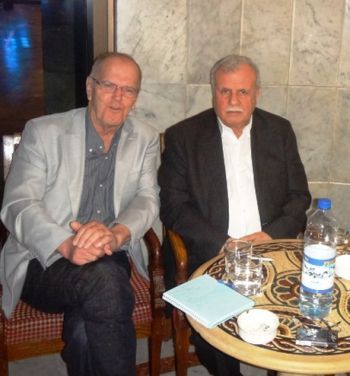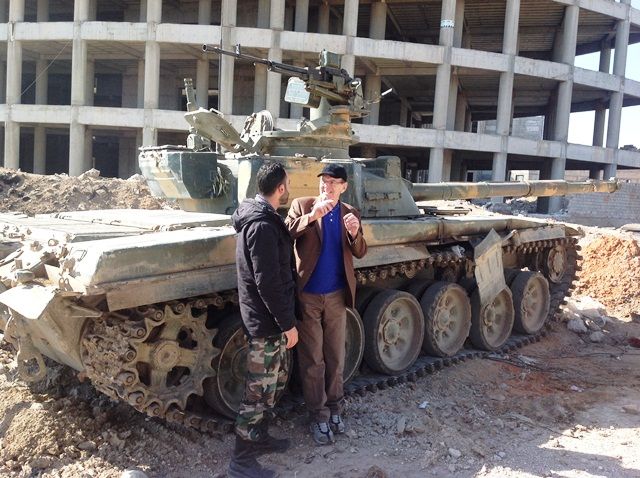
Publisher:
Bonnie King
CONTACT:
Newsroom@Salem-news.com
Advertising:
Adsales@Salem-news.com

~Truth~
~Justice~
~Peace~
TJP
Apr-19-2014 14:39

 TweetFollow @OregonNews
TweetFollow @OregonNews
The Death of Yarmouk Palestinian Camp
Dr. Franklin Lamb Salem-News.comYarmouk is a symbol of Palestinian insistence—insistence that the right of return be addressed, insistence that their narrative be recognized, that their need for safety be respected, that their rights be upheld, that they live in dignity.
 The author being briefed by Ziad el Shayer (Abu-Hazem) Sec-Gen of Fateh Intifada on 4/2/14 about the current situation inside Yarmouk camp the role of Fatah Intifada. (photo: Ayman 4/14) |
(YARMOUK PALESTINIAN CAMP, Damascus) - This observer does not write these words casually.
And he is no huge fan of some of the intellectually lazy quick spun internet conspiracy theories, too many of which appear given to flights from reality when facts get complicated and dispositive information is obscure.
However, after months of studying the political, social, military, and economic situation in Yarmouk camp, and based on insightful meetings with former camp residents and PLO stalwarts who have been active in the Palestinian cause going back to the 1980’s, or earlier, Yarmouk’s survival prospects appear fatally bleak.
If one allows oneself some basic deductions about the last three years and the ongoing upheaval, it is difficult to escape the conclusion, increasingly heard from Palestinians themselves, that Yarmouk, as with four other Palestinian refugee camps in Syria, is deeply wounded by the war being waged, that it is unlikely to survive the crisis, whether the latter ends in months or continues for decades, as many regional and western intelligence analysts are concluding.
In part, Yarmouk’s curse and current fate is due to its location. This is a triangular-sliced area of land pointing straight into central downtown Damascus, a strategic last piece in the mosaic necessary for a strong rebel advance on the capital. Its relative isolation from the conflict was shattered in mid-December 2012, when armed groups first entered the camp. The government surrounded the area; clashes ensued. UNRWA’s 28 schools and three clinics ceased operation, and the armed gangs also occupied homes and looted hospitals and stores. Camp residents who did not manage to flee, or did not want to, got caught in a tight stranglehold that continues today.
UNRWA’s HQ in Damascus estimates that more than 70 percent of the Palestinian refugees in Syria are in need of emergency humanitarian assistance immediately, while more than 50 percent are internally displaced. In Yarmouk alone, 142 people have died from hunger and lack of medical care just since June of 2013. Yet attempting to flee does not afford one copious or abundant opportunities either.
As of last week, more than 11,000 Palestinians refugees fleeing Syria had sought support from UNRWA in Jordan. Yet even if they can somehow gain entry to the country, the Kingdom’s policy is to deport them back to Syria, in essence robbing them of their right to survival.
UNRWA expects the numbers of Palestinians seeking safety in Jordan to exceed 20,000 by the end of 2014. Slamming the gates or deporting them all would be unconscionable. Even the White House reminded Jordan’s King Hussein that such a policy violates the international law principle of non-refoulement, a UN protocol protecting refugees from being sent back to places where their lives or freedoms could be threatened.
With respect to Yarmouk, there is a very real possibility that this largest of Syria’s refugee camps will succumb to a fate similar to those of the Tel al-Zaatar, Nabatieh, and Nahr al-Bared (now partially rebuilt after seven years) camps in Lebanon, but the loss of Yarmouk will be doubly compounded because in Syria, Palestinians found secure, sympathetic refuge in 1948. At that time, Palestinians fleeing their homeland were welcomed in solidarity—as Yarmouk became a symbol of resistance—but in 2014, there simply is no more welcome.
For over six decades the Palestinian residents here nurtured families and communities, integrated economically, and formed a subset of the cultural and intellectual fabric of a vibrant and proud Syrian society, but a civil war and a Western-backed insurgency have changed the landscape, perhaps for good.
Yet even besides resistance, Yarmouk is also a symbol of Palestinian insistence—insistence that the right of return be addressed, insistence that their narrative be recognized, that their need for safety be respected, that their rights be upheld, that they live in dignity. One aspect which always stood out for foreign visitors to Yarmouk were the youth clubs, which provided teenagers with a safe creative space where they developed skills while choosing colleges over Kalashnikovs.
UN negotiator Lakhdar Brahimi’s recent warning about the “Somalization” of Syria is not merely a disturbing metaphor, for as he told this observer in a meeting last year at the Dama Rose Hotel in Damascus, “Somalization” has already become a daily reality for Yarmouk camp.
The trio of Palestinian factions now fighting inside Yarmouk consist of Ahmed Jibril’s, Popular Front for the Liberation of Palestine-General Command (currently the PFLP-GC has approximately 800 fighters inside Yarmouk); the Nidal Front ( a few hundred fighters at most); and Fatah Intifada (close to 600 Palestinian fighters). The FI, since the death last year of its founder “Abu Musa”, is now headed by Abu Hazim, in whose company this observer spent an evening two weeks ago in Damascus along with FI’s articulate spokesman, Yaser al-Masri.
The Nidal Front (NF) is led by Khaled Abdul Majeed. Since 1992 it has been a >breakaway faction, of the PLO-affiliated Palestinian Popular Struggle Front, a split that came about in protest over Yasser Arafat’s compromises with Israel leading to the 1993 Oslo Accords. The NF, as of 4/11/14, has a few hundred fighters in Yarmouk, but is recruiting more as funds permit. It does not recognize the so-called Palestinian National Authority chaired by Mahmoud Abass. Majeed insisted to this observer that only armed resistance will liberate Palestine, and that the NF works with the PFLP-GC and FI on most Palestine strategy issues, evincing cooperation and coordination among the three PLO splinter groups inside Yarmouk.
Despite occasional bravado at news conferences, some of the leaders of these three factions will intimate privately that they see few prospects for Yarmouk, and that the camp’s fate is likely sealed, at least when compared to what it has been since its founding in 1957. And though they claim to be fighting “terrorists,” current refugee views with respect to Yarmouk’s “resistance” factions span the political spectrum, with some former camp residents, along with Palestinian analysts, viewing members of the above-noted groups as traitors.
Some of those who have fled Yarmouk, and even others still trapped inside or who have made it to surrounding countries, blame the three PLO splinter groups for making the Yarmouk situation even worse. Charges of treason may even be heard, or of playing the Palestinian card for political and economic gain, this while entering with Jabhat al-Nusra and other takfiri groups into fake negotiations—including the last seven negotiated “breakthroughs,” supposed to have lifted the siege while allowing those trapped to flee to safety, but which alas, as events have shown, were doomed to failure before they were even announced.
A friend at the Palestine Embassy in Beirut recently told this observer that the PLFP-GC, FI, and NF “are not Palestinian at all!
“Just by ID card and ancestry maybe,” the observer went on to add.
“They are owned by a foreign government and have many times targeted Yarmouk camp residents, claiming to ‘protect’ the camp. These guys, and the rebels, claim to be protecting Yarmouk, but the truth is sometimes they work with each other to exploit the crisis in various ways—for politics and money. Take your motorcycle and visit refugees from Yarmouk staying in Shatila, Burj Barajneh, Mar Elias-- or Yarmouk residents sheltering in any of the camps here in Lebanon. (Ask them) what they think about these traitors and what they are doing to destroy Yarmouk!”
Few Palestinians in Syria have much hope that the so-called ‘cease-fires’—nine announced over the past year—will hold or allow more than a trickle of aid into Yarmouk.
The most promising ‘reconciliation’ between rebels and government supporters inside Yarmouk began in early February. Al-Nusra and some of its allies did withdraw from the south side of the camp for nearly 30 days, but then re-entered, while the three Palestinian factions proclaimed they had been double-crossed. There are, not surprisingly, other views of what happened to the ‘reconciliation,’ and this observer heard one view in detail during a meeting with the al-Nusra spokesman and one of his commanders in south Damascus late last month.
Briefly put, the rebels claim that they kept the agreement for 30 days, but that PFLP-GC and Shabiha forces inside Yarmouk failed to allow in more than token aid for the refugees under siege, and failed to neutralize the camp. Al-Nusra claims the Palestinian factions instead brought in more arms and fighters, while continuing to use snipers to kill Yarmouk refugees trying to leave or get food. Reentering Yarmouk last month, (3/12/14), the Islamic State of the Iraq and the Levant (ISIL) admitted to this observer that they executed 21 Palestinians upon arrival in Yarmouk.
At about the same time, Al-Nusra kidnapped 30 other Palestinians who had mediated a ceasefire between the warring sides after they also returned. Both groups told this observer that their victims were ‘fair game’ because they were supporters of the government.
Again, the exact truth of events inside Yarmouk is illusive, but many opinions are offered by Yarmouk residents who did manage to escape in January-February 2014, and from former residents who still hope that something is left of their homes.
 The Syrian army surrounds approximately 3/4 of Yarmouk (photo: Ayman-3/14) |
Another sign of the approaching demise of Yarmouk is the pressure for its residents to join the long lines at Western embassies and seek a new, more secure and prosperous life for themselves and their children—far, far away from the refugee camp or their home country, Palestine. It is a development which many, including this observer, consider likely in the next couple of years.
Among the forces fueling it are John Kerry’s recent pronouncements of rewards for Palestinians who give up their birthright—the Right to Return to their ethnically cleansed homeland and their homes there. Also voiced are reports in Israeli media of a secret EU deal with Israel and the Palestinian Authority in Ramallah for substantial material rewards if the Right of Return is surrendered.
The Zionist colonial enterprise has been working for 65 years to deal this inalienable right a death blow, and mediation on the matter comes just as we are witnessing growing international support for sanctions against the apartheid state, Israel, which last week pledged to the US and the EU its assistance with this au courant idea.
Those hoping to asphyxiate the Right of Return by purchasing the birthright from its rightful heirs are using AIPAC-furnished ‘talking points,’ as seen in a mailing to Congressional offices last week. These include reports of a survey supposedly conducted in several Palestinian camps, including Beddawi camp near Tripoli Lebanon, and Ain al-Hilweh camp in Sidon, as well as among former Yarmouk residents, that Palestinian refugees want to emigrate—emigrate to anywhere they can get a visa to, from Asia to Zambia, but preferably to Europe.
Rumors this week about the German Embassy in Beirut being overwhelmed with applications from Palestinians have been echoed by other EU embassies in Lebanon. On 4/10/14, the German Embassy in Beirut went to the trouble to deny reports that their system had been hacked so that visa slots would be booked up minutes after they were released.
The embassy said the problem was due to over-demand and had since been rectified, but a report had emerged last week in the German national newspaper Welt am Sonntag, the Sunday edition of Die Welt, alleging that hackers had infiltrated the embassy’s visa appointment system in Beirut, and that they were snapping up all available slots to sell on the black market outside Yarmouk camp, as well as in Lebanon, for up to $5,000. The Beirut Daily Star reported that as of yesterday (4/10/14) there was one slot available for Palestinians wishing to apply for a family reunion national visa appointment, and none for those seeking a Schengen visa.
The “international community” has been unable to significantly help Palestinian refugees trapped in Yarmouk (or other Palestinian camps in Syria), and the camp may well die. The unfolding tragedy is devastating to the psyche of every Palestinian refugee in more ways than the sheer suffering of those directly affected by it. We see a ripple effect of anxiety and fear emanating from Yarmouk; walk by and you can experience it. For six decades Yarmouk defined Palestinian solidarity and hope, but now it defines loss, uncertainty, not only for its residents, but for Palestinians all over Syria and in the wider diaspora.
Those still trapped in Yarmouk and elsewhere continue their descent into the abyss. Perhaps not until the guns finally fall silent, in months or maybe decades, will we fully realize the price paid by Palestinian refugees, and Syrians, and the extent of their shared loss.
But what has already become perfectly clear is the magnitude of our own shared shame for allowing the carnage, starvation, and crimes against Palestinian refugees to continue.
 Dr. Franklin Lamb is doing research in Syria and can be reached c/o fplamb@gmail.com
Dr. Franklin Lamb is doing research in Syria and can be reached c/o fplamb@gmail.com
He is the author of The Price We Pay: A Quarter-Century of Israel’s Use of American Weapons Against Civilians in Lebanon. He contribute to Uprooted Palestinians Blog
Please Sign
http://www.petitiononline.com/
Beirut Mobile: +961-70-497-804
 Dr. Franklin Lamb is Director of the Sabra Shatila Foundation. Contact him at: fplamb@sabrashatila.org. He is working with the Palestine Civil Rights Campaign in Lebanon on drafting legislation which, after 62 years, would, if adopted by Lebanon’s Cabinet and Parliament grant the right to work and to own a home to Lebanon’s Palestinian Refugees.
Dr. Franklin Lamb is Director of the Sabra Shatila Foundation. Contact him at: fplamb@sabrashatila.org. He is working with the Palestine Civil Rights Campaign in Lebanon on drafting legislation which, after 62 years, would, if adopted by Lebanon’s Cabinet and Parliament grant the right to work and to own a home to Lebanon’s Palestinian Refugees.
Franklin Lamb’s book on the Sabra-Shatila Massacre, International Legal Responsibility for the Sabra-Shatila Massacre, now out of print, was published in 1983, following Janet’s death and was dedicated to Janet Lee Stevens. He was a witness before the Israeli Kahan Commission Inquiry, held at Hebrew University in Jerusalem in January 1983.
 |
Articles for April 18, 2014 | Articles for April 19, 2014 | Articles for April 20, 2014
Salem-News.com:





Terms of Service | Privacy Policy
All comments and messages are approved by people and self promotional links or unacceptable comments are denied.
[Return to Top]
©2025 Salem-News.com. All opinions expressed in this article are those of the author and do not necessarily reflect those of Salem-News.com.